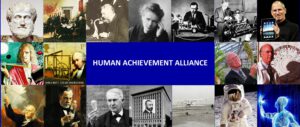The third week of October marks the anniversary of a great human achievement. On October 21, 1879, Thomas Edison ran an electric current through an experimental light bulb. He had tried thousands of filaments in other bulbs in the past. While none worked, he considered them successes in that they limited the possibilities of what would work. Today, we’d say he appreciated that he was “failing forward.” The next morning, the bulb still glowed! He had invented the first workable light bulb.
In the U.S. we have a Memorial Day, Veterans Day, Labor Day, even Earth Day. If we want our future to see more Edisons and more breakthroughs in every field of human endeavor, I suggest we mark October 21 as Human Achievement Day.
The situation might look bad.
The context for Human Achievement Day, explained in detail on the Human Achievement Alliance website, is that exponential technologies in information, nanotech, biotech, robotics, and AI promise a future of unimaginable prosperity with longer, healthier lives for all and will drive the economy and society in the future. Yet today we see pushback from all sides—fears of robots taking jobs, AI ruling us, gene editing creating a “bio-divide” like the “digital divide” fear in the 90s, and calls for ever more government regulations.
Worse, there’s a major disconnect between, on the one hand, the needs of businesses for workers with the requisite skills—especially in exponential tech— and indivuduals for remunerative, fulfilling careers and, on the other hand, the government-dominated schooling system with its focus on rote learning and compliance. Before the pandemic, there were 1.6 million more job openings than unemployed Americans.
Worse still, higher education has indoctrinated a generation of graduates with collectivist and post-modernist dogma. These individuals now lead media, entertainment, civic organizations, religion, charities, corporate boards, politics and, of course, education.
But we can make the future bright.
Yet our future is anything but grim. Despite public policies that hamper innovations, the only thing holding us back is attitude.
That is where Human Achievement Day comes in. It would:
- Raise consciousness about what an incredible world we live in, COVID notwithstanding, and about the promise of exponential technologies;
- Highlight the foundations of achievement, i.e., Enlightenment values including reason, economic and social progress, individual liberty to create, and your own moral character; and
- Replace the pessimism, nihilism, anger, and malevolence in our culture with optimism, purpose, joy in achievement, and benevolence.
How you can celebrate.
There are many ways you can mark this day:
- Post on social media “Happy Human Achievement Day!” with your own thoughts and reflections and a link to the website. You can also link to a one-page summary and video. Challenge your friends—and yourself!—to identify all the achievers on the website’s banner and their achievement, or identify their own favorite achievers.
- Take time to appreciate your own achievements. What are you most proud of? What are your future aspirations? Recommit to your values and achievement goals. Fortify the virtues you’ll need to reach those goals.
- Take time with your family, friends and, especially, children to reflect on the incredible achievements in our world that we often take for granted. Computers, smartphones, the internet, Zoom, Amazon deliveries, medicines that have saved our lives, all of which didn’t exist centuries or even decades ago.
- Ask kids to imagine a future in which they play the “If not for” game. “If not for the nanotech material in a replacement kidney, my mom would spend more time—and money we don’t have—on a dialysis machine than with us.” “If not for his brain implant and artificial eyes, my dad would be blind.” “If not for the discovery of the nature of my illness by artificial intelligence, I’d still be sick.” “If not for the genetically engineered cells that cured my cancer, I’d be dead.”
- Play “How can we make it happen?” with the kids. What would it take to engineer the environment of Mars to make it suitable for human biology? Or what would it take to engineer human biology to make it suitable for the environment of Mars? Or, better still, what would it take to engineer the human genome so that we would not age and die?
- At your business or workplace, remind your fellow employees of the productive good they are doing and remind them to take pride.
We are all achievers, whether nurturing a child to maturity or business to profitability; writing a song, poem, business plan, or dissertation; laying the bricks to a building, designing it, or arranging for its financing. So let’s celebrate this week so the spirit of achievement will last year round!
——
 Edward Hudgins, Ph.D., is founder of the Human Achievement Alliance. He has a long career in public policy and cultural advocacy. He can be reached at [email protected] .
Edward Hudgins, Ph.D., is founder of the Human Achievement Alliance. He has a long career in public policy and cultural advocacy. He can be reached at [email protected] .


